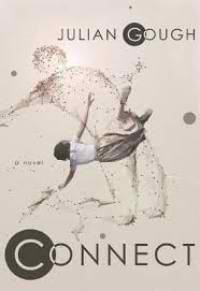Connect by Julian Gough
 Wednesday, August 15, 2018 at 8:48AM
Wednesday, August 15, 2018 at 8:48AM 
First published in Great Britain in 2018; published by Doubleday/Nan A. Talese on August 14, 2018
Without much subtlety, Connect makes the point that different systems (the human body, society, the universe itself) are organized in similar ways, and ponders the connection that results in that commonality. To make sure we get it, Julian Gough quotes the Upanishads and scientists and philosophers and poets and Philip K. Dick, all noting that so many vastly different things in the universe, including its vastly different people, are all fundamentally alike. That’s an interesting premise for a novel, but Connect is only partially successful in conveying it, as opposed to explaining it.
Colt is an autistic 18-year-old boy. He freaks out when he’s touched. He is homeschooled (unconventionally) by his mother Naomi because he can’t be around other kids without fighting them. Colt spends most of his life engrossed in videogame environments. Naomi wants him to live in the moment; he argues that living in the moment is impossible. Naomi wants him to engage with the real world; Colt argues that reality is a matter of perception, and what he perceives online is just as real as anything he perceives when he takes off his visor. On the other hand, Colt meets a damaged girl online named Sasha, for whom he feels the kind of desire that can’t be satisfactorily acquitted online.
Naomi is a scientist who was once a porn star who is into S&M, a character trait that isn’t entirely gratuitous. She’s working on a project to regrow limbs. It isn’t ready for human experimentation but it has shown promise in rats. Colt, who has a genius for coding, steals Naomi’s work and offers it for publication at a conference, forcing Naomi to attend when the paper is accepted. That gets Naomi out of the house, clearing the way for Colt to use the research to enlarge his corpus callosum in the hope that he will become normal, or at least able to understand people, Sasha.
The research has military implications, however, and Naomi finds herself trouble with her ex-husband and the government for publishing the paper without the military’s approval. Fortunately for the government, the next incarnation of the NSA can make information disappear pretty easily by taking control of electronic devices (a trick that is only a small step away from tricks the government already performs).
All of this sets up a plot that involves the military’s (primarily Colt’s father’s) desire to use Colt’s newfound abilities as a human supercomputer to better identify and kill America’s enemies. The plot pits Colt against his father and against an automated defense system that is designed to kill America’s enemies, one of whom (it decides) is Colt. A good chunk of the story consists of Colt using his gaming environment in an attempt to thwart the defense system.
One of the story’s more pedestrian themes involves the power of love, which (surprise, surprise) conquers all. I appreciate the sentiment but Gough’s execution of that theme is a bit heavy-handed. To Gough’s credit, the novel gives a new twist to the romantic comedy formula by digitizing it in an epic battle between Colt’s game world and the immune system (they hate each other, they need each other, they love each other), but the related coming-of-age theme seems artificial because Colt only learns lessons because his mother’s neural experimentation allowed him to overcome his autism — hardly a formula that younger socially-challenged readers will be able to follow as they come of age.
The book isn’t any more successful in addressing the theme of connection. One logical extension of recognizing that we are all fundamentally the same is to stop thinking in terms of “us” and “them” because there is no “them,” there is only an all-encompassing “us.” The novel tries to advance that thought by anticipating the emergence of a new consciousness, something godlike. While other writers projecting the rise of a godlike machine intelligence have done so with dread, Connect speculates that a godlike consciousness making decisions based on reason rather than fear might be just what an angry world needs. It’s an appealing thought, although surrendering autonomy (assuming we have any) to an artificial consciousness might be more crippling than the disease it cures.
While Connect scores points for grappling with big ideas, it becomes excessively preachy at the end. I agree with the message of unity that’s preached and I think the message is well-intentioned, but the final chapters read more like an essay than a work of fiction. They are written from the perspective of a machine intelligence (the System of Systems) that didn’t strike me as the voice of an intelligent machine. It’s constantly “digging deeper” and going to “another level” as it explores dominant themes of religion and philosophy and myth, but the superficial conclusions it draws hardly seem to justify the intellectual effort (e.g., killing a large chunk of the Earth’s inhabitants would be bad for the Earth’s inhabitants; inequitable distribution of resources is unfair and something should be done about that). On the whole, Connect works as an adventure story, but it fizzles out when it tries to become a deep philosophical tome. I can recommend the novel as high tech thriller that might particularly appeal to fans of gaming, but I would suggest skimming through or skipping the mundane pages that are narrated by the godlike System of Systems.
RECOMMENDED WITH RESERVATIONS